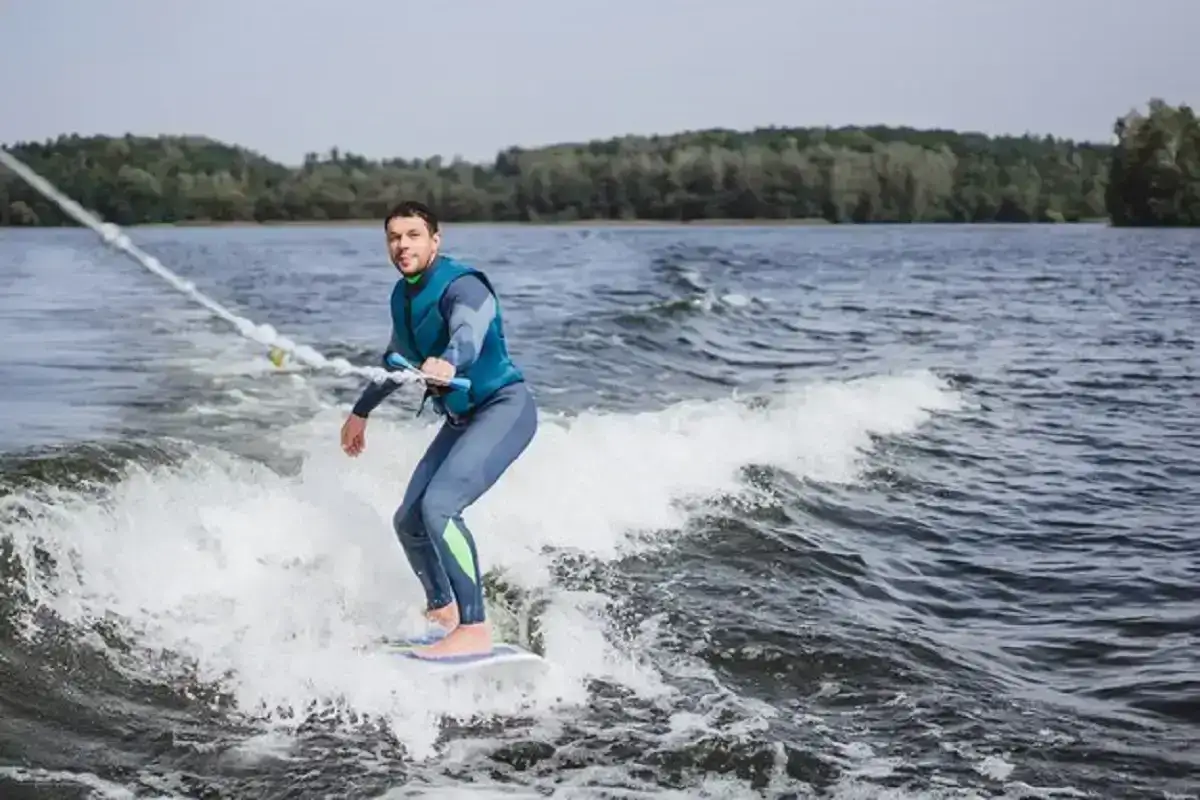Introduction
Water skiing on a water skier on florida waters may legally ski during which situation? expansive, scenic waters is an exhilarating sport enjoyed by many residents and tourists alike. However, like all water activities, water skiing comes with a set of rules and regulations that ensure the safety of the participants and protect others who share the waters. Among these rules, specific times and conditions dictate when a water skier can legally operate on Florida waters. In this article, we will explore the legal aspects of water skiing in Florida, focusing on when water skiing is allowed, the guidelines for safe skiing, and the importance of observing these regulations. This article provides a comprehensive understanding of the nuances involved in Florida’s water skiing regulations, with a detailed breakdown of permissible hours, conditions, and safety considerations.
1. Understanding Florida’s Water Skiing Regulations
Water skiing, like many outdoor activities in a water skier on florida waters may legally ski during which situation? is regulated under state laws to ensure the safety of participants and to mitigate risks for other waterway users. Florida’s regulations are implemented by the Florida Fish and Wildlife Conservation Commission (FWC), which oversees boating and water safety guidelines throughout the state. These rules specify who can operate watercrafts, where they can operate, and, importantly, the hours during which skiing is permissible.
The key regulation pertaining to water skiing is that it is only allowed during certain daylight hours. According to Florida law, water skiing is permissible only from one-half hour before sunrise to one-half hour after sunset. This time limitation is rooted in the need for adequate visibility to ensure the safety of skiers, boat operators, and others on the water. Let’s delve deeper into what these permissible hours mean, why they are enforced, and the consequences of skiing outside of these times.
2. Permissible Hours for Water Skiing in Florida
The stipulation that water skiing is allowed only between one-half hour before sunrise and one-half hour after sunset has significant implications for water skiers. These hours are set to ensure that there is enough natural light for safe navigation. Reduced visibility can make it challenging for the boat operator to monitor the skier, avoid obstacles, and recognize other watercrafts in the area.
The half-hour intervals serve as a buffer, providing a period in which light is ample, yet the sun’s glare does not excessively obstruct vision. Sunrise and sunset times vary throughout the year, so skiers must stay aware of local sunrise and sunset schedules to comply with these regulations. Violating these time constraints can lead to citations, fines, and increased safety risks.
3. Situations in Which Water Skiing is Permissible
While the hours surrounding sunrise and sunset primarily define when skiing is allowed, a water skier on florida waters may legally ski during which situation? law also outlines other conditions and situations under which skiing can legally occur. Here are the most critical aspects:
- Daylight Hours Requirement: As mentioned, water skiing is only allowed during the daylight hours defined by one-half hour before sunrise and one-half hour after sunset.
- Visibility and Weather Conditions: In addition to observing legal skiing hours, skiers must consider visibility and weather conditions. Even during permissible hours, conditions like heavy fog, storms, or high winds make skiing unsafe and can limit the operator’s and skier’s visibility. Skiing under such adverse conditions is highly discouraged and may lead to legal penalties if it endangers the skier or others.
- Presence of a Designated Observer: For water skiing to be legal, the towing boat must have an observer or “spotter” in addition to the operator. This observer must be at least 14 years old and have a clear view of the skier. The observer’s role is critical in maintaining communication with the skier and alerting the operator to any changes or emergencies.
- Use of Proper Equipment: Skiers and boat operators must also ensure that they use appropriate safety equipment, such as personal flotation devices (PFDs) and towing ropes that meet Florida’s safety standards. Lack of safety equipment or defective equipment can make water skiing illegal even during permissible hours.
By understanding and adhering to these guidelines, water skiers can enjoy their sport while remaining compliant witha water skier on florida waters may legally ski during which situation? water safety laws.
4. Rationale Behind Permissible Hours and Situational Requirements
The limitations on permissible hours for water skiing are based on a variety of safety considerations:
- Enhanced Visibility During Daylight: Daylight allows the operator and observer to clearly see the skier, obstacles in the water, and other boats. The half-hour before sunrise and after sunset provides additional safety by accounting for natural light variations.
- Reduced Boating Traffic: Water skiing in daylight hours is safer because there is generally more visibility for all water users, making it easier for them to see and avoid each other. Boating traffic often peaks during the day, and staying within regulated hours helps reduce the risk of collisions.
- Prevention of Alcohol-Related Incidents: Limiting skiing to daylight hours also helps curb the risk of alcohol-related accidents. Florida’s strict boating under the influence (BUI) laws apply to water skiing, and skiers or operators found under the influence can face legal repercussions, including fines and jail time.
5. Consequences of Violating Florida’s Water Skiing Regulations
Failing to observe Florida’s water skiing regulations can have severe consequences. Here are some common outcomes for skiers or operators who violate these laws:
- Legal Penalties: Violators can receive citations, leading to fines and potential court appearances. Repeat offenders may face stiffer penalties.
- Increased Insurance Premiums: Boaters found violating skiing regulations may see an increase in their insurance premiums. Insurance companies consider adherence to state boating laws, and any infractions might classify the boater as a higher risk.
- Accident Liability: Should an accident occur outside permissible skiing hours, operators and skiers may be held liable for any damages or injuries. Such liability could result in hefty medical expenses or damage compensation.
6. Safety Tips for Water Skiers on Florida Waters
Adhering to a water skier on florida waters may legally ski during which situation? legal requirements is the foundation for a safe water skiing experience, but skiers and operators can take additional measures to enhance safety:
- Understand Local Water Conditions: Before skiing, be aware of the local water conditions, tides, and currents. In many areas of Florida, coastal conditions can change rapidly, which may impact a skier’s control.
- Wear a Life Jacket: Florida law mandates that skiers must wear a U.S. Coast Guard-approved life jacket at all times. This safety measure is crucial, especially in cases where the skier may fall unexpectedly.
- Avoid Alcohol Consumption: Water skiing requires coordination and quick reflexes. Alcohol consumption can significantly impair judgment and physical abilities, leading to dangerous situations.
- Check Equipment Regularly: Make sure that the boat, tow rope, and skis are in good working condition. Faulty equipment can lead to accidents and injuries, even if the skier is skilled.
- Learn Basic Hand Signals: Proper communication between the skier, observer, and boat operator is essential for a safe experience. Skiers should learn basic hand signals to convey messages such as “stop,” “speed up,” or “slow down.”
7. Common Misconceptions About Water Skiing Rules in Florida
Despite clear regulations, there are common misconceptions regarding water skiing laws in Florida. Here are a few:
- “I Can Ski Anytime I Want if I’m Careful”: Some assume that being cautious allows for skiing outside permissible hours, but the law explicitly prohibits skiing outside designated times.
- “If I’m the Only One on the Water, the Rules Don’t Apply”: Even if the waters appear deserted, the same rules and hours apply. Observing these guidelines ensures personal safety regardless of other traffic.
- “I Don’t Need a Spotter if I’m Experienced”: The law requires an observer for safety reasons, regardless of the skier’s skill level.
8. The Role of the Florida Fish and Wildlife Conservation Commission (FWC)
The FWC plays a pivotal role in enforcing water skiing regulations acrossa water skier on florida waters may legally ski during which situation?. Through patrols, educational programs, and enforcement actions, the FWC ensures that all waterway users follow boating and skiing rules. They perform regular inspections, educate the public about water safety, and conduct enforcement actions for violators. Their mission is to protect not only the water skiers but also the vast ecosystem and the numerous people who share Florida’s waters.
9. Tips for Visitors Water Skiing in Florida
For visitors unfamiliar with Florida’s unique waterways and skiing regulations, here are some useful tips:
- Familiarize Yourself with Local Laws: Florida’s boating and skiing laws may differ from those in other states. Check local regulations to avoid inadvertent violations.
- Choose Popular Skiing Spots: Many popular areas, such as Lake Weir, Lake Okeechobee, and the Intracoastal Waterway, offer scenic and safe environments for water skiing.
- Work with Licensed Guides: Hiring a licensed guide or instructor is a great way to ensure compliance with local laws while enjoying Florida’s waters safely.
10. Conclusion: Observing Regulations for a Safe and Enjoyable Water Skiing Experience
Water skiing on a water skier on florida waters may legally ski during which situation? waters is an exhilarating experience that must be approached with caution and respect for state laws. By following the legal hours, ensuring adequate visibility, and using proper safety equipment, water skiers can enjoy the sport safely while minimizing risks to themselves and others. Ultimately, adhering to Florida’s water skiing regulations is more than just about avoiding penalties; it is about creating a safe and enjoyable environment for all waterway users. Florida’s vibrant waterways offer plenty of opportunities for adventure—just remember to ski responsibly and within the law.



